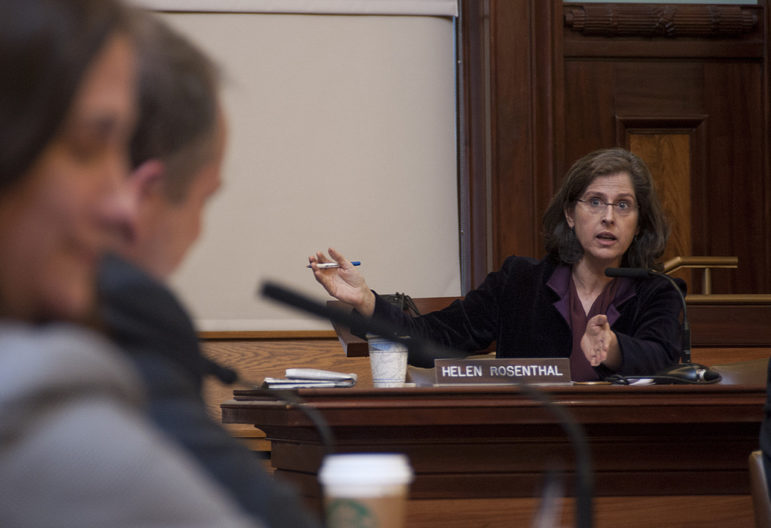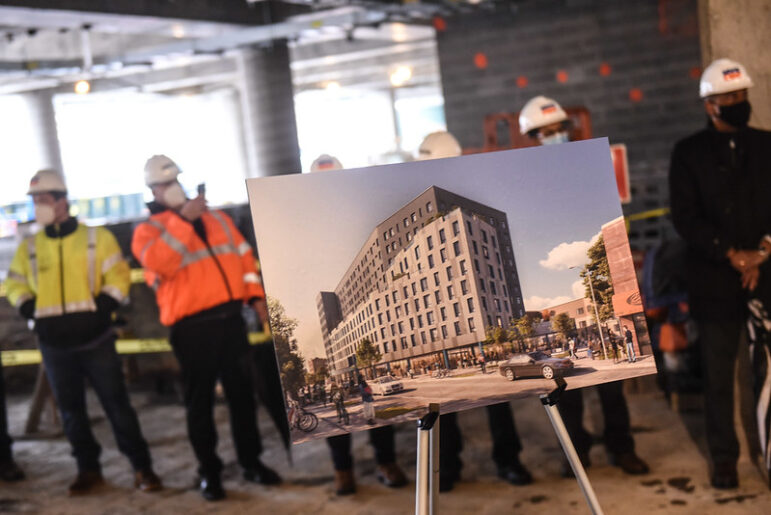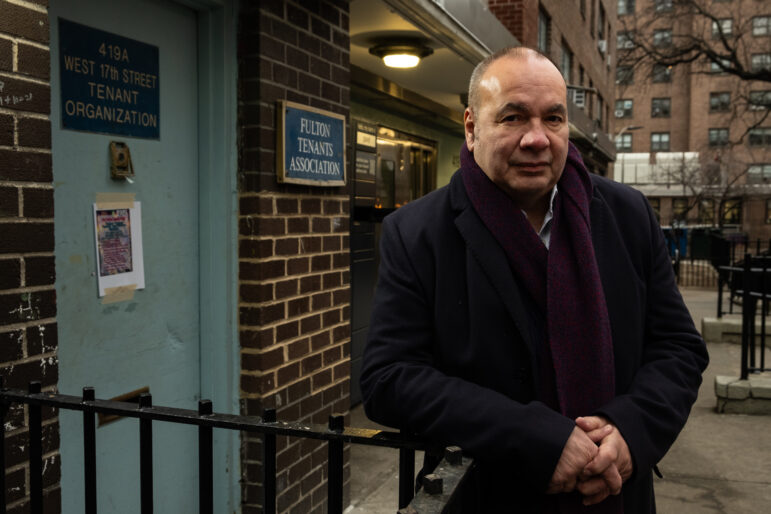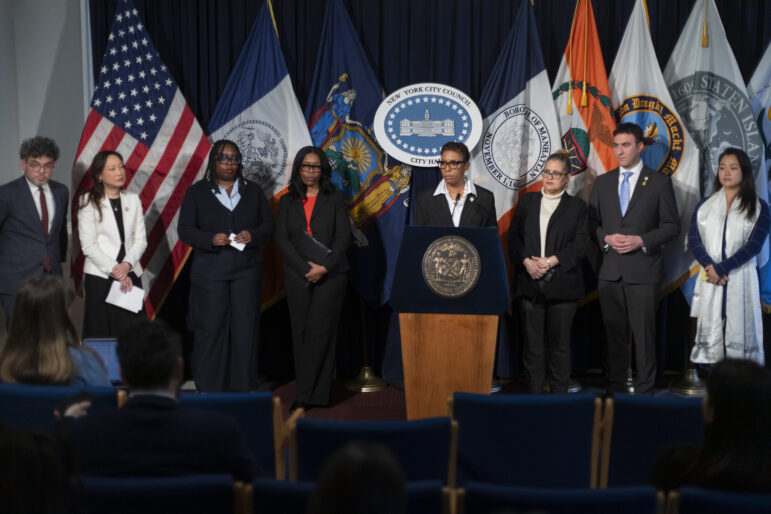
William Alatriste for the New York City Council
District 6 Councilmember Helen Rosenthal at a 2014 Council hearing.
Anger over real-estate development and school desegregation on the Upper West Side are fueling what appears to be one of the stiffest challenges faced by a sitting City Councilmember in 2017.
In district 6 incumbent Helen Rosenthal is in a rematch with Mel Wymore, a systems engineer and former community board chair, her chief rival in a crowded Democratic primary in 2013. Wymore snared the New York Times endorsement four years ago, but Rosenthal received about 1,300 more votes out of 29,000 cast to win with roughly 27 percent.
Wymore announced in March that he was running again, and his bid has received generous press attention, in part because Wymore, a man who gave birth to two children and is the executive director of the transgender-rights advocacy organization TransPac, would be the first transgender Council member. Rosenthal has outraised but also outspent Wymore so far, leaving her with a slim $7,000 advantage in cash-on-hand at last count.
A third Democrat, Cary Goodman, is also on the ballot for the September 12 primary. He emphasizes opposition to the American Museum of Natural History’s plan to expand its footprint into Theodore Roosevelt Park, which Goodman says would erase too much open space. Rosenthal has supported that expansion plan, even committing city capital money to it, although she has expressed reservations about some particulars of the plan.
Wymore offers a broader critique than Goodman does of the incumbent’s performance. He argues that Rosenthal has failed to take decisive action to stop the loss of small businesses in the district or to fight out-of-context real-estate development—and that she has failed to engage or energize constituents around other issues, whether it’s Donald Trump (“[U]nlike Council Members in other parts of the city, our Councilmember has failed to organize our community to fight back”) or constituent services (“We have heard story after story of West Siders who went to the current Council Member’s office looking for help and didn’t get it.”)
Rosenthal, however, believes her opposition stems largely from a single episode: the contentious and racially charged argument over whether to redraw the zones for three elementary schools in the district, where Rosenthal stood alone among elected officials in favor of the rezoning plan. “And for that, my friends,” she told a group of City Limits interns recently, “I earned a primary, which I am very proud of.”
Threats and consequences
The school controversy centered on P.S. 199, a successful school that is majority white and more affluent, and P.S. 191, a nearby school that has struggled with academic and safety issues and is majority Black and Latino and serves many low-income families. P.S. 452, another successful school, was also part of the mapping change Community Education Council 3 (CEC3) considered beginning in 2015.
The CEC’s goals were to alleviate crowding at 199 and at 452 and to reduce the socioeconomic skew among all three schools in the hope of improving 191’s performance. One key tool for achieving both aims was the opening of a new school on the West Side, something scheduled for 2018 that Rosenthal says she convinced the de Blasio administration to move up to this coming fall. Another step was to redraw the zone lines, which previously channeled residents of the largely white, middle class Lincoln Towers development to PS 199 and residents of NYCHA’s Amsterdam Houses to PS 191. CEC approved the rezoning by a 9-1 margin in November.
According to Kim Watkins, now the president of CEC3, Rosenthal was the only public official to attend all the Council meetings dealing with that plan. She was also the only one to support the CEC’s considering redrawing the lines. Assemblywoman Linda Rosenthal, who is not related to the Councilmember, and State Senator Brad Hoylman attended a rally against it. Comptroller Scott Stringer cheered the Assemblywoman’s efforts. Even Congressman Jerrold Nadler opposed the plan.
Councilmember Rosenthal, gesturing to a map of the Lincoln Towers area during a recent interview, said most pols scorned the plan because “Anybody who broke apart the white community here would be voted out of office,” since the Towers generate a hefty chunk of District 6 turnout. Indeed, at one CEC3 meeting, a parent threatened electoral consequences for pols who supported the rezoning, and two petitions opposing the move on Charge.org garnered hundreds of signatures.
On his campaign website, where the school rezoning commands its own “issues” page, Wymore nods to the value of diversity but adds: “The only way to fulfill this vision is for parents, teachers, and students to be included in the decision-making process. We cannot dictate to communities what’s best for them instead of elevating their voices.”
In an interview with City Limits, Wymore eschewed mention of white opponents of the plan, saying his concern was that “minority communities” in Amsterdam Houses did not have their voices heard in the process. (There is no indication in any coverage of the CEC3 controversy that any opposition emanated from Amsterdam Houses.) What’s really needed, Wymore told our interns, is a full rezoning of the entire district as well as a citywide “housing plan that will diversify our neighborhoods.”
At least nine of the people who signed petitions opposing the school rezoning have also donated money to Wymore’s campaign. One of them is Alex Harrington, who grew up in the district and has two children who attended PS 199 and one who still does. “I got an actively bad impression of [Rosenthal] during the rezoning in terms of not really listening or being sensitive to the needs of my immediate community and supporting a rezoning program that I felt wasn’t going to deliver the results she was promising it would,” Harrington says. “My kid’s class is going to be six children larger next year as a result of this rezoning—not smaller, larger—so it’s made things worse at the school. It was predictable that was going to happen. We pointed out those shortcomings and no one seemed to care.”
Harrington says that for him and other parents residing in Lincoln Towers, it was Rosenthal’s approach that rankled most. “If I felt she was reasonable and attentive in that process, even if I disagreed with her, I might not feel as strongly about it.” Goodman, the third candidate in the race, echoes that critique: “People felt marginalized by the process. It’s not that she’s gone too far in the direction of integration, it’s that she hasn’t gone enough on engaging people.”
Rosenthal’s campaign rejects the process critique, insisting that she keeps in close touch with the parents involved in schools throughout the district. Aides say that while she endorsed early on the rationale for changing the lines, she didn’t formally embrace the specifics of the plan until the CEC had made its sentiments clear.
“The people in this room had nothing to do with zone lines that perpetuated a school–PS191–with concentrated poverty,” Rosenthal said in her statement to CEC3 last November. “No one here is personally responsible for it, but we can take collective responsibility for righting a wrong.”
Kim Watkins, who now leads CEC3 and was on the school council during the rezoning debate, says she isn’t surprised the rezoning is a big issue in the Council campaign. “Given the rancor, the threats, the crying and the true discombobulation of this major change it doesn’t surprise me at all because people don’t like change.” But Watkins believes that, contrary to the critics, Rosenthal did help to achieve a measure of consensus around the rezoning plan. After all, nine of the CEC’s 10 members did support it. “We had such vastly different backgrounds but we all came to the same conclusion and we did it hand and hand with the process, and Helen Rosenthal was so integral to that process.”
Big buildings also an issue
Wymore’s campaign believes the school rezoning is just one of several issues where Rosenthal’s actions or alleged apathy have created pockets of resentment. It’s the combination of those dissatisfied factions that drives his challenge, whose energetic nerve center is a headquarters on Broadway that, at least on the day City Limits visited, was teeming with fresh-faced volunteers.
Wymore certainly doesn’t emphasize the school rezoning in his public statements. There, the focus is on real-estate. “Empty storefronts litter the Upper West Side. Our campaign counted them: over 130, stretching up and down Columbus, Amsterdam, Broadway, and the streets that connect them,” read a recent release. “City Council continues to protect a system that favors landlords over everyone else. We need a representative who’ll stand up for our community businesses, stand up to the real estate industry driving them out, and fill the empty storefronts with vibrant, local businesses.”
The longtime community organizer also faults Rosenthal for failing to advocate strenuously against tall new buildings planned for the area. Council District 6 has seen a substantial amount of recent development; according to the Furman Center, the local community district ranked seventh out of the city’s 59 districts for new residential capacity in 2016. A few buildings have generated deep opposition, like 200 Amsterdam Avenue, which is supposed to rise to a height of 666 feet and be the neighborhood’s tallest building.
The objectionable projects were largely “as of right”—jarring because they represented a drastic change from what currently exists on the site, but permitted under the current zoning. Because “as of right” projects typically don’t enter the city’s land-use process, in which the local Councilmember has extensive power, the member has little to no leverage over them. Wymore says that’s what needs to change.
“We need to reform land use,” Wymore said in an interview. “We need to put into place a mechanism that will balance real estate and the communities. And that’s not in place. As of right needs to be mitigated.” The local community board voted against the mayor’s Zoning for Quality and Affordability policy, but Rosenthal supported it. It called for a moratorium on super-tall buildings, but none was imposed. “We have a history, a record, of our Councilmember here voting with the developers, with the real industry. We asked for delays, we asked for changes to the policies, we asked for moratoriums. We didn’t get anything.”
Wymore’s campaign also says what is needed is a special permit for the district to require developers planning dramatic increases in density to undergo public review even if they are as of right. Such an approach would be novel, according to sources familiar with City Planning practice, and could encounter legal obstacles.
Rosenthal’s campaign says the special permit idea would restrict the city’s ability to create housing to ease the affordability crunch. But Rosenthal has also looked for unorthodox solutions to the supertall scourge on the West Side, suggesting at a Council hearing in June hearing that urban renewal areas should be revived because of the extra leverage they provided against developers.
Rosenthal, who was endorsed early by TenantsPAC, has focused on the problem of illegal hotels throughout her term, and did raise questions about two major development projects in the district as early as 2014. More recently, the Councilmember wrote to Extell Development in June voicing concerns about plans for 36-44 West 66th Street site, although that site began causing a stir months earlier, in February.
The proposed high-rise at 200 Amsterdam is now undergoing additional city review—a victory for opponents. The Councilwoman and Wymore clashed earlier this year at a rally against the building, with Rosenthal preventing her opponent from speaking.
Her foes say Rosenthal was late to the table in the opposition to that project. But Olive Freud, the leader of the protest movement against tower, disputes that account. “Nobody in the area wants a 600-foot building. So everyone is against it. Helen being our Council lady works with me. She helps in every way that a Councilmember can,” Freud says. “As the Councilwoman, Helen is in a position to do more to help, and she does. But I’m sure Mel is just as seething as the rest of us.”
Rosenthal’s campaign says her stance on development has been “responsible,” meaning she has tried to balance concerns about development impact against her general belief that the city needs more housing, especially affordable housing. Hence her advocacy for changes in the de Blasio administration’s mandatory inclusionary housing and Zoning for Quality and Affordability measures, which she ultimately supported.
Goodman believes Rosenthal’s devoting city capital money to the 135,000-square-foot expansion of the Museum of Natural History into Roosevelt Park strikes the wrong balance. “Essentially, she was giving out public dollars to the museum to cut own our public park,” says Goodman, who runs a BID in the Bronx and says Wymore also hasn’t been strong enough on the museum issue. Goodman dismisses the argument that West Siders don’t need additional green space because they have Central Park to use. “I think that misses the point. When you go to Central Park, it’s not the quiet little corner where you sit and read a book. It’s sort of like its own little Disney World.”
Rosenthal’s office says she has pressed the museum “to make sure that Teddy Roosevelt Park will be minimally altered by the expansion.”
From traffic safety to gender issues
Even as she tries to rebut Wymore’s claim that she’s been asleep at the wheel on overdevelopment, Rosenthal does not emphasize her land-use advocacy when she reviews her time in office.
She points instead to her advocacy for traffic safety, including drafting a law that cracked down on dangerous taxi drivers. Rosenthal also takes nerdy pride in her chairmanship of the contracts committee, where her budget analyst skills (she worked the the city’s budget office for most of her adult life) helped her stop a bloated schools contact saved the city an amount somewhere in the nine figures. She’s advocated for the disabled as well.
If re-elected, she says, her top priority will be other gender-equity measures. In an email to City Limits before our interview, she said the “final issue in this race … involves women’s voice in the Council and valuing women’s work.”
“Women make up more than half of NYC voters, but only a quarter of the Council members. With retirements, those numbers may fall to one in five (10 of 51),” she wrote. “Here on the Upper West Side, we pride ourselves on being progressive. But a City Council where only one in five members are women isn’t progressive. It doesn’t reflect the contributions and abilities women bring to this City. But we can make women’s voices more fairly heard through this year’s municipal elections.”
When City Limits asked Rosenthal exactly how gender figured into the race against Wymore—who is a man, but also has two kids who call him “mom,” suggesting her opponent hasn’t benefited from all the traditional advantages of male hegemony, Rosenthal suggested it was not much of an issue at all. “If you go to my website, you don’t see anything talking about gender. That won’t be my top issue.”
Wymore says his transgender background is unlikely to be an issue, although it is a motivation. “My experience is that the voters don’t really care that I’m transgender. They care that I can do the job. Can I fill those storefronts? Can I make sure that we have school space for everyone? Can I make sure that we have affordable housing for seniors and low-income families?” He adds: “My experience as a transgender person is about knowing what its like to be left out.”
Gender aside, the leading candidates in the race present a personality contrast that, to some degree, each candidate embraces. Rosenthal projects the image of a policy wonk and budget hawk who dishes details and is, she says, “terrible at press.” Wymore, more polished and circumspect in his interview answers, stresses his chops as a political and community organizer.
With a low-wattage mayoral primary on the Democratic ballot for September, it’s unclear what kind of turnout the District 6 race will generate—and what that turnout number will mean for the prospects of the three candidates. (Hyman Drusin, a Republican, will be on the ballot in November.) But Harrington believes the race is attracting a lot of attention. “I think within my local area, which is Lincoln Towers, I’ve never seen a Council race where there’s more interest.”
A few days before that primary, the school year will begin across the city and in the buildings affected by the CEC3 zoning vote that looms large in the Council race. But while the impact of that vote on Rosenthal’s survival will be known soon, the impact of the policy could take years to evaluate. “It will be interesting to see the enrollment pattern over the next couple of years to know whether it was successful,” says the CEC’s Watkins. “I think we’ll have to let history answer that question specifically, and [to see] what we were all able to do in terms of changing people’s minds.”
With reporting by members of the City Limits Youth Training Program in Public-Service Journalism: Lianis Fernandez, Terrence Freeman, LaShea Gallop, Valeria Hernandez, Maquan Keith, Jonah Muhammad and Janiya Taylor.









9 thoughts on “Anger Over Development, School Rezoning Fuels West Side Council Clash”
Looks like even the diehard white liberals of the UWS want safe schools for their kids. And who could blame them.
Make no mistake! Helen Rosenthal’s lame attempt to make herself look like she stood alone against racism IS A FARCE. Outside of politics I’m sure you can count her minority friends on one finger. In her attempt to use the UWS to run for Controller or Public Advocate, she has neglected the neighborhood. Nobody but her campaign really even knew who she was until the rezoning issue. As a parent who attended every single meeting on this, I can also say that Kim Watkins is not being truthful when she says Helen came to all of them. She DID NOT! As is her pattern, Helen Rosenthal takes credit for many things here but has done little or no work to earn the accolades. She has told us over the years that “nothing can be done” about 200 Amsterdam, then swoops in late in the game to attach herself to the delay ruling. As a minority Upper West Sider the rezoning issue is about Math not Melanin. Only 1 out of ten kids can read in that system, yet they took the principal and her failing staff to a new building, forced in the middle class parents who will pay for tutoring and even teachers to make up for the shortcomings that will raise scores and make the CEC3 and the DOE look like they were right. Rosenthal gave both middle fingers to the UWS and Lincoln Towers. In Sept, we will return the favor.
You are correct! This long, seemingly detailed article is wrong in several places as it relates to the school zoning, and it misses the key points entirely. The article states PS 452 was overcrowded. It was far from over crowded, in fact it was hoping to grow. PS 452 was first opened only a few years ago to help alleviate the overcrowding at PS 87, which it successfully did! Closing PS 452 on West 77th Street and re-drawing the surrounding zoning lines has lead to a return to over crowding not only at PS 87 but also PS 199, PS 9 and PS 166. Second, the article makes it seem as though the CEC was unitedly in favor of this rezoning and re-siting plan. The truth is that the CEC took an unprecedented and perhaps illegal step by acting outside of its appointed role, which was to vote on any plan presented to it by the DOE. Instead, certain CEC members CREATED the plan, behind closed doors (and in apparent violation of Open Meetings Law – see the published advisory opinion which states so) and without the knowledge of all CEC members (see statements by then member Noah Gotbaum). This was always an issue of elementary school capacity – the DOE had long planned to open a new school in the southern portion of District 3 but the CEC, with Helen’s help, squashed that plan, instead voting to permanently close over 300 seats in the area. Helen and the CEC’s turning of this situation into race relations is disgraceful not only because it is wrong but also because neither Helen nor any single member of the CEC was personally impacted by their plan. How convenient for them. This is Trumpism. Helen should be booted out.
When Assembly member Linda Rosenthal, BP Gale Brewer, Comptroller Scott Stringer, and Congress member Nadler are not for a school redistricing plan and CM Helen Rosenthal is perhaps there is something wrong with the plan. Calling your colleagues cowards and your constituents racists is not leadership. It’s one more example of the kind of vindictive politics that Helen Rosenthal practices. She lost Lincoln Towers in the last race and now she is punishing them. Helen just took advantage of a situation. Something she does regularly.
I am the only ,candidate in this race with a platform — on development, education, small businesses, gender equity, etc. http://WWW.VOTECARYGOODMAN.COM.
Liberals like Samantha bee and her husband were fighting the reasoning. See,s liberal ideas are good for other peoples children not theirs. I wonder what private school her kids will be going to now.
There’s no UWS candidate who really stood up for fairness and desegregation in UWS schools. The CEC3 rezoning addressed very little: not how schools became unequal in the first place, not PTA fundraising as a supposedly off-budget source of unequal funding, not the way upper class parents ignore zones to choose their schools anyway. The privileged parents who rolled mob-deep at the rezoning meetings made it seem “radical” to stand up for minimal changes to a school system that’s maximally skewed in their favor. It’s incredible to say that they weren’t consulted. Even the unambitious CEC tried for several years to get them to agree to *something* before voting to rezone. Helen Rosenthal supported the CEC in doing something, however inadequate. It doesn’t make her a hero, but other electeds didn’t even do that much.
On another note, I know very little about Mel Wymore himself yet, but his campaign volunteers whom I saw at Pride were straight, white, self-important jerks who were literally shoving children out of their way. I was embarrassed for them and whoever sent them out.
That last bit about the Wymore volunteers at pride is a flagrant lie. I was marching with Chuck Schumer’s group directly behind Wymore’s group. They were a good 20 feet at least behind any group in front of them and didn’t touch anyone. Most of then came up to Senator Schumer and were incredibly polite to him. Also of the people to come up to Schumer half of them were white at most, and how you can possibly tell what someone’s sexuality is from looking at them is baffling to me. You are a blatant liar and it’s pathetic. I don’t care very much either way what happens with the election but I don’t get why you would randomly come lie on a comment section. Maybe you are Rosenthal supporter I don’t know but a liar you definitely are.
Not particularly a Rosenthal supporter. I was with Wymore’s volunteers on the street after the march and then on the subway with the Pride crowds. Nice that you saw something different, but I didn’t. I identified them as straight based on their behavior and conversation, no guessing involved. And nothing “random” about posting that experience with workers for a candidate who wants to represent me.